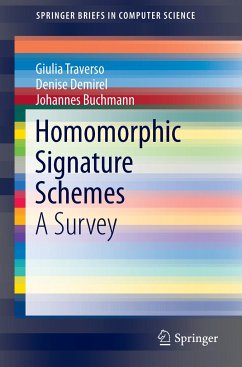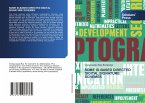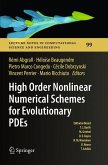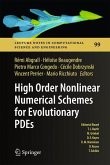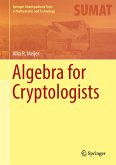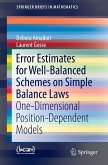- Broschiertes Buch
- Merkliste
- Auf die Merkliste
- Bewerten Bewerten
- Teilen
- Produkt teilen
- Produkterinnerung
- Produkterinnerung
Homomorphic signature schemes are an important primitive for many applications and since their introduction numerous solutions have been presented. Thus, in this work we provide the first exhaustive, complete, and up-to-date survey about the state of the art of homomorphic signature schemes. First, the general framework where homomorphic signatures are defined is described and it is shown how the currently available types of homomorphic signatures can then be derived from such a framework. In addition, this work also presents a description of each of the schemes presented so far together with…mehr
Andere Kunden interessierten sich auch für
![SOME ID-BASED DIRECTED DIGITAL SIGNATURE SCHEMES SOME ID-BASED DIRECTED DIGITAL SIGNATURE SCHEMES]() Uamprasada Rao BodasingiSOME ID-BASED DIRECTED DIGITAL SIGNATURE SCHEMES54,99 €
Uamprasada Rao BodasingiSOME ID-BASED DIRECTED DIGITAL SIGNATURE SCHEMES54,99 €![Concise Computer Mathematics Concise Computer Mathematics]() Ovidiu BagdasarConcise Computer Mathematics50,99 €
Ovidiu BagdasarConcise Computer Mathematics50,99 €![Operators for Similarity Search Operators for Similarity Search]() Deepak POperators for Similarity Search39,99 €
Deepak POperators for Similarity Search39,99 €![High Order Nonlinear Numerical Schemes for Evolutionary PDEs High Order Nonlinear Numerical Schemes for Evolutionary PDEs]() High Order Nonlinear Numerical Schemes for Evolutionary PDEs77,99 €
High Order Nonlinear Numerical Schemes for Evolutionary PDEs77,99 €![High Order Nonlinear Numerical Schemes for Evolutionary PDEs High Order Nonlinear Numerical Schemes for Evolutionary PDEs]() High Order Nonlinear Numerical Schemes for Evolutionary PDEs77,99 €
High Order Nonlinear Numerical Schemes for Evolutionary PDEs77,99 €![Algebra for Cryptologists Algebra for Cryptologists]() Alko R. MeijerAlgebra for Cryptologists50,99 €
Alko R. MeijerAlgebra for Cryptologists50,99 €![Error Estimates for Well-Balanced Schemes on Simple Balance Laws Error Estimates for Well-Balanced Schemes on Simple Balance Laws]() Debora AmadoriError Estimates for Well-Balanced Schemes on Simple Balance Laws39,99 €
Debora AmadoriError Estimates for Well-Balanced Schemes on Simple Balance Laws39,99 €-
-
-
Homomorphic signature schemes are an important primitive for many applications and since their introduction numerous solutions have been presented. Thus, in this work we provide the first exhaustive, complete, and up-to-date survey about the state of the art of homomorphic signature schemes. First, the general framework where homomorphic signatures are defined is described and it is shown how the currently available types of homomorphic signatures can then be derived from such a framework. In addition, this work also presents a description of each of the schemes presented so far together with the properties it provides. Furthermore, three use cases, electronic voting, smart grids, and electronic health records, where homomorphic signature schemes can be employed are described. For each of these applications the requirements that a homomorphic signature scheme should fulfill are defined and the suitable schemes already available are listed. This also highlights the shortcomings of current solutions. Thus, this work concludes with several ideas for future research in the direction of homomorphic signature schemes.
Produktdetails
- Produktdetails
- SpringerBriefs in Computer Science
- Verlag: Springer / Springer International Publishing / Springer, Berlin
- Artikelnr. des Verlages: 978-3-319-32114-1
- 1st ed. 2016
- Seitenzahl: 76
- Erscheinungstermin: 4. Mai 2016
- Englisch
- Abmessung: 235mm x 155mm x 5mm
- Gewicht: 131g
- ISBN-13: 9783319321141
- ISBN-10: 3319321145
- Artikelnr.: 44688735
- Herstellerkennzeichnung Die Herstellerinformationen sind derzeit nicht verfügbar.
- SpringerBriefs in Computer Science
- Verlag: Springer / Springer International Publishing / Springer, Berlin
- Artikelnr. des Verlages: 978-3-319-32114-1
- 1st ed. 2016
- Seitenzahl: 76
- Erscheinungstermin: 4. Mai 2016
- Englisch
- Abmessung: 235mm x 155mm x 5mm
- Gewicht: 131g
- ISBN-13: 9783319321141
- ISBN-10: 3319321145
- Artikelnr.: 44688735
- Herstellerkennzeichnung Die Herstellerinformationen sind derzeit nicht verfügbar.
'1 From Digital to Homomorphic Signature Schemes 1.1 Digital Signatures 1.2 Digital Signature Schemes Security Definition 1.2.1 Known-Message Attack 1.2.2 Chosen-Message Attack 1.2.3 Adaptive Chosen-Message Attack 1.3 Homomorphic Signature Schemes 1.4 Homomorphic Signature Schemes Security Definition 2 Homomorphic Signature Schemes 2.1 Homomorphic Signature Schemes for the Single-User Scenario 2.1.1 Linearly Homomorphic Signature Schemes 2.1.2 Homomorphic Signature Schemes for Polynomial Functions 2.1.3 Fully Homomorphic Signatures 2.2 Homomorphic Signature Schemes for the Multi-Users Scenario 2.2.1 Multiple Sources Homomorphic Signature Schemes 2.2.2 Homomorphic Aggregate Signature Schemes 3 Evaluation of Homomorphic Signature Schemes 3.1 Hardness Assumptions 3.1.1 Bilinear Groups 3.1.2 RSA 3.1.3 Lattices 3.2 Efficiency and Size 3.3 Security 3.3.1 Weak Adversary 3.3.2 Strong Adversary 3.4 Privacy 3.5 Random Oracle Model vs. Standard Model
4 State of the Art of Homomorphic Signature Schemes 4.1 Linearly Homomorphic Signature Schemes Defined Over Bilinear Groups 4.1.1 Signing a Linear Subspace: Signature Schemes for Network Coding, by Boneh et al. (2009) 4.1.2 Homomorphic Network Coding Signatures in the Standard Model, by Attrapadung and Libert (2011) 4.1.3 Computing on Authenticated Data: New Privacy Definitions and Constructions, by Attrapadung et al. (2012) 4.1.4 Efficient Network Coding Signatures in the Standard Model, by Catalano et al. (2012) 4.1.5 Improved Security for Linearly Homomorphic Signatures: A Generic Framework, by Freeman (2012) <4.1.6 Efficient Completely Context-Hiding Quotable and Linearly Homomorphic Signatures, by Attrapadung et al. (2013) 4.1.7 Secure Network Coding Against Intra/Inter-Generation Pollution Attacks, by Guangjun et al. (2013) 4.1.8 Summary of Linearly Homomorphic Signature Schemes Defined Over Bilinear Groups 4.2 RSA-Based Linearly Homomorphic Signature Schemes 4.2.1 Secure Network Coding Over the Integers, byGennaro et al. (2010) 4.2.2 Adaptive Pseudo-Free Groups and Applications, by Catalano et al. (2011) 4.2.3 Efficient Network Coding Signatures in the Standard Model, by Catalano et al. (2012) 4.2.4 Improved Security for Linearly Homomorphic Signatures: A Generic Framework, by Freeman (2012) 4.2.5 Summary of RSA-Based Linearly Homomorphic Signature Schemes 4.3 Lattice-Based Linearly Homomorphic Signature Schemes 4.3.1 Linearly Homomorphic Signatures over Binary Fields and New Tools for Lattice-Based Signatures, by Boneh and Freeman (2011) 4.3.2 Lattice-Based Linearly Homomorphic Signature Scheme over Binary Fields, by Wang et al. (2013) 4.3.3 Summary of Lattice-Based Linearly Homomorphic Signature Schemes 4.4 Homomorphic Signature Schemes for Polynomial Functions 4.4.1 Homomorphic Signatures for Polynomial Functions, by Boneh and Freeman (2011) 4.4.2 Homomorphic Signatures for Polynomial Functions with Shorter Signatures, by Hiromasa et al. (2013) 4.4.3 Homomorphic Signatures with Efficient Verification for Polynomial Functions, by Catalano et al. (2014) 4.4.4 Summary of Homomorphic Signature Schemes for Polynomial Functions 4.5 Fully Homomorphic Signature Schemes 4.5.1 Leveled Fully Homomorphic Signatures from Standard Lattices, by Gorbunov et al. (2014) 4.5.2 Adaptively Secure Fully Homomorphic Signatures Based on Lattices, by Boyen et al. (2014) 4.5.3 Leveled Strongly-Unforgeable Identity-Based Fully Homomorphic Signatures, by Wang et al. (2015) 4.5.4 Summary of Fully Homomorphic Signature Schemes 4.6 Multiple Sources Linearly Homomorphic Signature Schemes
4.6.1 Signatures for Multi-Source Network Coding, by Czap and Vajda (2010) 4.6.2 Short Signature Scheme for Multi-Source Network Coding, by Yan et al. (2011) 4.6.3 Efficient Multiple Sources Network Coding Signature in the Standard Model, by Zhang et al. (2014) 4.6.4 Summary of Multiple Sources Linearly Homomorphic Signature
4 State of the Art of Homomorphic Signature Schemes 4.1 Linearly Homomorphic Signature Schemes Defined Over Bilinear Groups 4.1.1 Signing a Linear Subspace: Signature Schemes for Network Coding, by Boneh et al. (2009) 4.1.2 Homomorphic Network Coding Signatures in the Standard Model, by Attrapadung and Libert (2011) 4.1.3 Computing on Authenticated Data: New Privacy Definitions and Constructions, by Attrapadung et al. (2012) 4.1.4 Efficient Network Coding Signatures in the Standard Model, by Catalano et al. (2012) 4.1.5 Improved Security for Linearly Homomorphic Signatures: A Generic Framework, by Freeman (2012) <4.1.6 Efficient Completely Context-Hiding Quotable and Linearly Homomorphic Signatures, by Attrapadung et al. (2013) 4.1.7 Secure Network Coding Against Intra/Inter-Generation Pollution Attacks, by Guangjun et al. (2013) 4.1.8 Summary of Linearly Homomorphic Signature Schemes Defined Over Bilinear Groups 4.2 RSA-Based Linearly Homomorphic Signature Schemes 4.2.1 Secure Network Coding Over the Integers, byGennaro et al. (2010) 4.2.2 Adaptive Pseudo-Free Groups and Applications, by Catalano et al. (2011) 4.2.3 Efficient Network Coding Signatures in the Standard Model, by Catalano et al. (2012) 4.2.4 Improved Security for Linearly Homomorphic Signatures: A Generic Framework, by Freeman (2012) 4.2.5 Summary of RSA-Based Linearly Homomorphic Signature Schemes 4.3 Lattice-Based Linearly Homomorphic Signature Schemes 4.3.1 Linearly Homomorphic Signatures over Binary Fields and New Tools for Lattice-Based Signatures, by Boneh and Freeman (2011) 4.3.2 Lattice-Based Linearly Homomorphic Signature Scheme over Binary Fields, by Wang et al. (2013) 4.3.3 Summary of Lattice-Based Linearly Homomorphic Signature Schemes 4.4 Homomorphic Signature Schemes for Polynomial Functions 4.4.1 Homomorphic Signatures for Polynomial Functions, by Boneh and Freeman (2011) 4.4.2 Homomorphic Signatures for Polynomial Functions with Shorter Signatures, by Hiromasa et al. (2013) 4.4.3 Homomorphic Signatures with Efficient Verification for Polynomial Functions, by Catalano et al. (2014) 4.4.4 Summary of Homomorphic Signature Schemes for Polynomial Functions 4.5 Fully Homomorphic Signature Schemes 4.5.1 Leveled Fully Homomorphic Signatures from Standard Lattices, by Gorbunov et al. (2014) 4.5.2 Adaptively Secure Fully Homomorphic Signatures Based on Lattices, by Boyen et al. (2014) 4.5.3 Leveled Strongly-Unforgeable Identity-Based Fully Homomorphic Signatures, by Wang et al. (2015) 4.5.4 Summary of Fully Homomorphic Signature Schemes 4.6 Multiple Sources Linearly Homomorphic Signature Schemes
4.6.1 Signatures for Multi-Source Network Coding, by Czap and Vajda (2010) 4.6.2 Short Signature Scheme for Multi-Source Network Coding, by Yan et al. (2011) 4.6.3 Efficient Multiple Sources Network Coding Signature in the Standard Model, by Zhang et al. (2014) 4.6.4 Summary of Multiple Sources Linearly Homomorphic Signature
'1 From Digital to Homomorphic Signature Schemes 1.1 Digital Signatures 1.2 Digital Signature Schemes Security Definition 1.2.1 Known-Message Attack 1.2.2 Chosen-Message Attack 1.2.3 Adaptive Chosen-Message Attack 1.3 Homomorphic Signature Schemes 1.4 Homomorphic Signature Schemes Security Definition 2 Homomorphic Signature Schemes 2.1 Homomorphic Signature Schemes for the Single-User Scenario 2.1.1 Linearly Homomorphic Signature Schemes 2.1.2 Homomorphic Signature Schemes for Polynomial Functions 2.1.3 Fully Homomorphic Signatures 2.2 Homomorphic Signature Schemes for the Multi-Users Scenario 2.2.1 Multiple Sources Homomorphic Signature Schemes 2.2.2 Homomorphic Aggregate Signature Schemes 3 Evaluation of Homomorphic Signature Schemes 3.1 Hardness Assumptions 3.1.1 Bilinear Groups 3.1.2 RSA 3.1.3 Lattices 3.2 Efficiency and Size 3.3 Security 3.3.1 Weak Adversary 3.3.2 Strong Adversary 3.4 Privacy 3.5 Random Oracle Model vs. Standard Model
4 State of the Art of Homomorphic Signature Schemes 4.1 Linearly Homomorphic Signature Schemes Defined Over Bilinear Groups 4.1.1 Signing a Linear Subspace: Signature Schemes for Network Coding, by Boneh et al. (2009) 4.1.2 Homomorphic Network Coding Signatures in the Standard Model, by Attrapadung and Libert (2011) 4.1.3 Computing on Authenticated Data: New Privacy Definitions and Constructions, by Attrapadung et al. (2012) 4.1.4 Efficient Network Coding Signatures in the Standard Model, by Catalano et al. (2012) 4.1.5 Improved Security for Linearly Homomorphic Signatures: A Generic Framework, by Freeman (2012) <4.1.6 Efficient Completely Context-Hiding Quotable and Linearly Homomorphic Signatures, by Attrapadung et al. (2013) 4.1.7 Secure Network Coding Against Intra/Inter-Generation Pollution Attacks, by Guangjun et al. (2013) 4.1.8 Summary of Linearly Homomorphic Signature Schemes Defined Over Bilinear Groups 4.2 RSA-Based Linearly Homomorphic Signature Schemes 4.2.1 Secure Network Coding Over the Integers, byGennaro et al. (2010) 4.2.2 Adaptive Pseudo-Free Groups and Applications, by Catalano et al. (2011) 4.2.3 Efficient Network Coding Signatures in the Standard Model, by Catalano et al. (2012) 4.2.4 Improved Security for Linearly Homomorphic Signatures: A Generic Framework, by Freeman (2012) 4.2.5 Summary of RSA-Based Linearly Homomorphic Signature Schemes 4.3 Lattice-Based Linearly Homomorphic Signature Schemes 4.3.1 Linearly Homomorphic Signatures over Binary Fields and New Tools for Lattice-Based Signatures, by Boneh and Freeman (2011) 4.3.2 Lattice-Based Linearly Homomorphic Signature Scheme over Binary Fields, by Wang et al. (2013) 4.3.3 Summary of Lattice-Based Linearly Homomorphic Signature Schemes 4.4 Homomorphic Signature Schemes for Polynomial Functions 4.4.1 Homomorphic Signatures for Polynomial Functions, by Boneh and Freeman (2011) 4.4.2 Homomorphic Signatures for Polynomial Functions with Shorter Signatures, by Hiromasa et al. (2013) 4.4.3 Homomorphic Signatures with Efficient Verification for Polynomial Functions, by Catalano et al. (2014) 4.4.4 Summary of Homomorphic Signature Schemes for Polynomial Functions 4.5 Fully Homomorphic Signature Schemes 4.5.1 Leveled Fully Homomorphic Signatures from Standard Lattices, by Gorbunov et al. (2014) 4.5.2 Adaptively Secure Fully Homomorphic Signatures Based on Lattices, by Boyen et al. (2014) 4.5.3 Leveled Strongly-Unforgeable Identity-Based Fully Homomorphic Signatures, by Wang et al. (2015) 4.5.4 Summary of Fully Homomorphic Signature Schemes 4.6 Multiple Sources Linearly Homomorphic Signature Schemes
4.6.1 Signatures for Multi-Source Network Coding, by Czap and Vajda (2010) 4.6.2 Short Signature Scheme for Multi-Source Network Coding, by Yan et al. (2011) 4.6.3 Efficient Multiple Sources Network Coding Signature in the Standard Model, by Zhang et al. (2014) 4.6.4 Summary of Multiple Sources Linearly Homomorphic Signature
4 State of the Art of Homomorphic Signature Schemes 4.1 Linearly Homomorphic Signature Schemes Defined Over Bilinear Groups 4.1.1 Signing a Linear Subspace: Signature Schemes for Network Coding, by Boneh et al. (2009) 4.1.2 Homomorphic Network Coding Signatures in the Standard Model, by Attrapadung and Libert (2011) 4.1.3 Computing on Authenticated Data: New Privacy Definitions and Constructions, by Attrapadung et al. (2012) 4.1.4 Efficient Network Coding Signatures in the Standard Model, by Catalano et al. (2012) 4.1.5 Improved Security for Linearly Homomorphic Signatures: A Generic Framework, by Freeman (2012) <4.1.6 Efficient Completely Context-Hiding Quotable and Linearly Homomorphic Signatures, by Attrapadung et al. (2013) 4.1.7 Secure Network Coding Against Intra/Inter-Generation Pollution Attacks, by Guangjun et al. (2013) 4.1.8 Summary of Linearly Homomorphic Signature Schemes Defined Over Bilinear Groups 4.2 RSA-Based Linearly Homomorphic Signature Schemes 4.2.1 Secure Network Coding Over the Integers, byGennaro et al. (2010) 4.2.2 Adaptive Pseudo-Free Groups and Applications, by Catalano et al. (2011) 4.2.3 Efficient Network Coding Signatures in the Standard Model, by Catalano et al. (2012) 4.2.4 Improved Security for Linearly Homomorphic Signatures: A Generic Framework, by Freeman (2012) 4.2.5 Summary of RSA-Based Linearly Homomorphic Signature Schemes 4.3 Lattice-Based Linearly Homomorphic Signature Schemes 4.3.1 Linearly Homomorphic Signatures over Binary Fields and New Tools for Lattice-Based Signatures, by Boneh and Freeman (2011) 4.3.2 Lattice-Based Linearly Homomorphic Signature Scheme over Binary Fields, by Wang et al. (2013) 4.3.3 Summary of Lattice-Based Linearly Homomorphic Signature Schemes 4.4 Homomorphic Signature Schemes for Polynomial Functions 4.4.1 Homomorphic Signatures for Polynomial Functions, by Boneh and Freeman (2011) 4.4.2 Homomorphic Signatures for Polynomial Functions with Shorter Signatures, by Hiromasa et al. (2013) 4.4.3 Homomorphic Signatures with Efficient Verification for Polynomial Functions, by Catalano et al. (2014) 4.4.4 Summary of Homomorphic Signature Schemes for Polynomial Functions 4.5 Fully Homomorphic Signature Schemes 4.5.1 Leveled Fully Homomorphic Signatures from Standard Lattices, by Gorbunov et al. (2014) 4.5.2 Adaptively Secure Fully Homomorphic Signatures Based on Lattices, by Boyen et al. (2014) 4.5.3 Leveled Strongly-Unforgeable Identity-Based Fully Homomorphic Signatures, by Wang et al. (2015) 4.5.4 Summary of Fully Homomorphic Signature Schemes 4.6 Multiple Sources Linearly Homomorphic Signature Schemes
4.6.1 Signatures for Multi-Source Network Coding, by Czap and Vajda (2010) 4.6.2 Short Signature Scheme for Multi-Source Network Coding, by Yan et al. (2011) 4.6.3 Efficient Multiple Sources Network Coding Signature in the Standard Model, by Zhang et al. (2014) 4.6.4 Summary of Multiple Sources Linearly Homomorphic Signature

